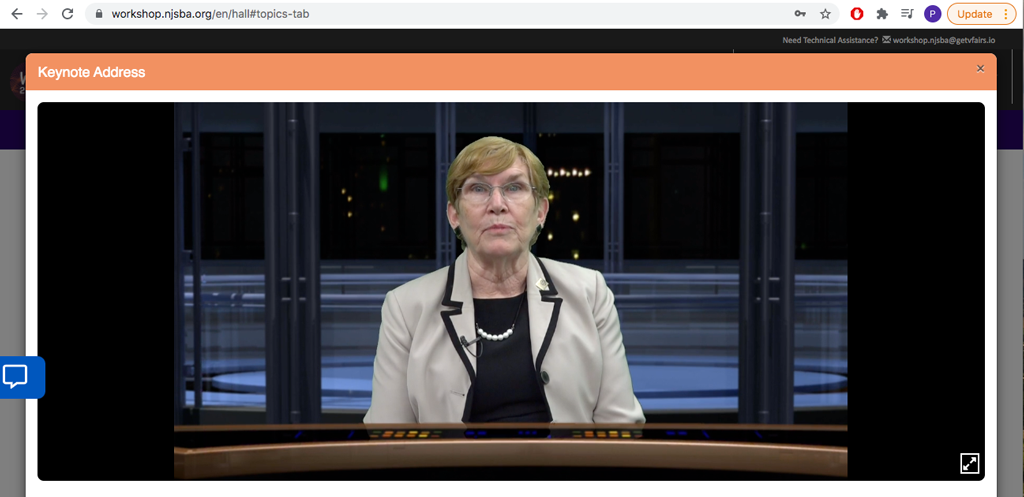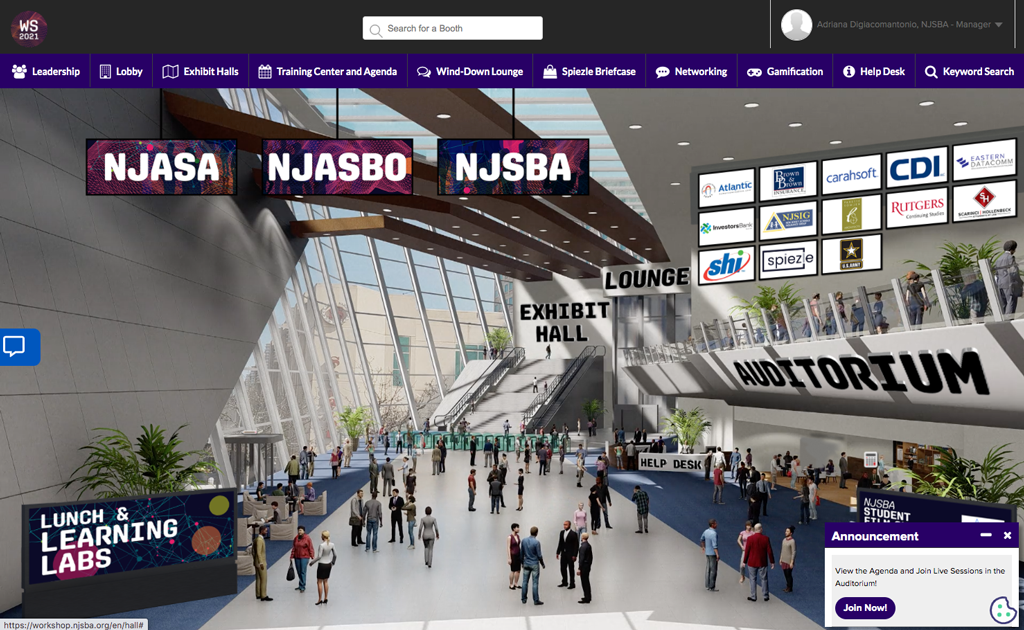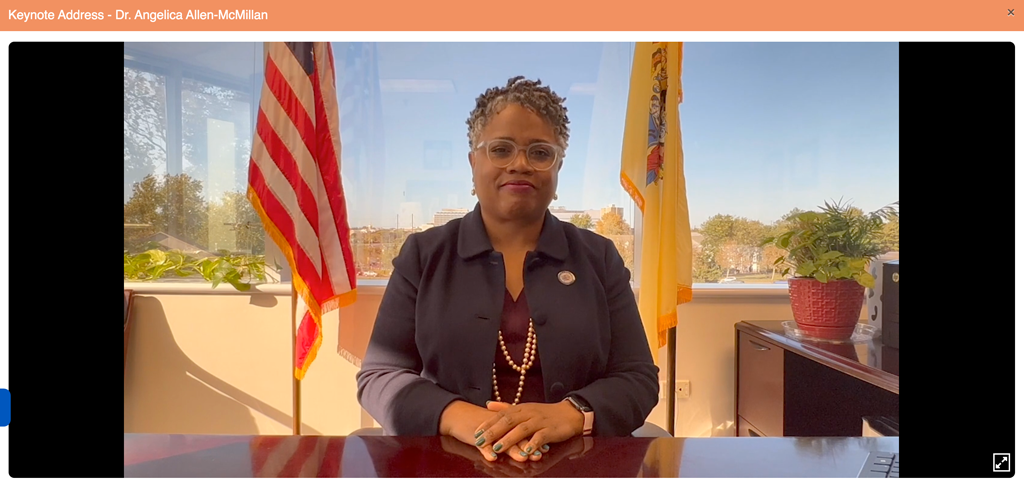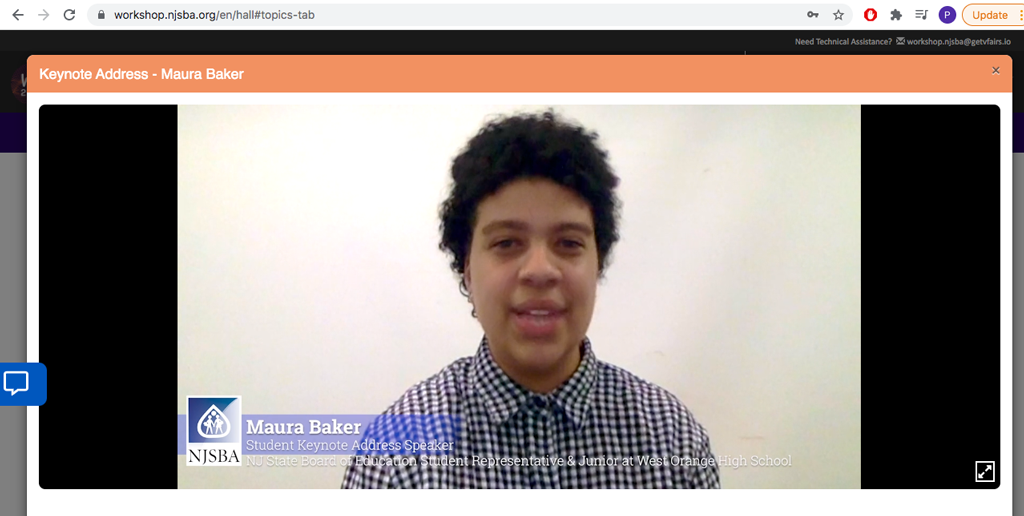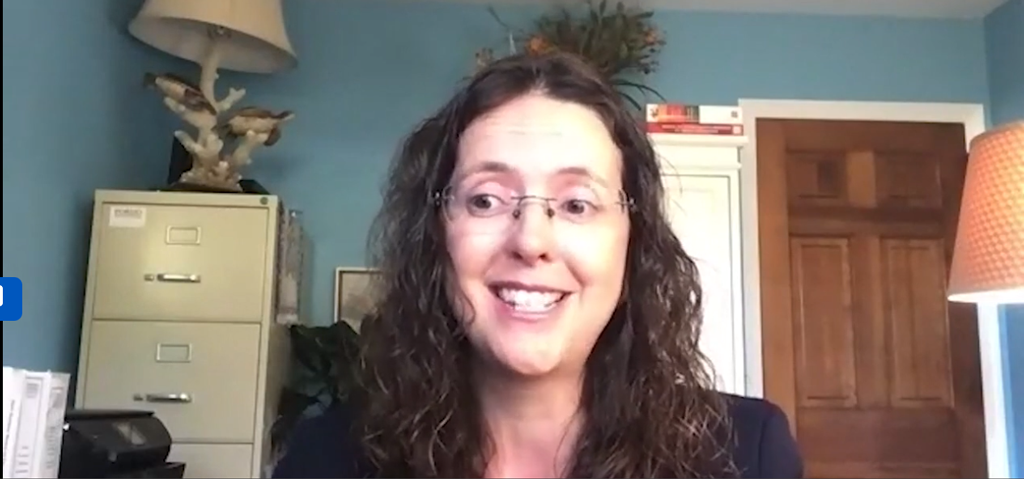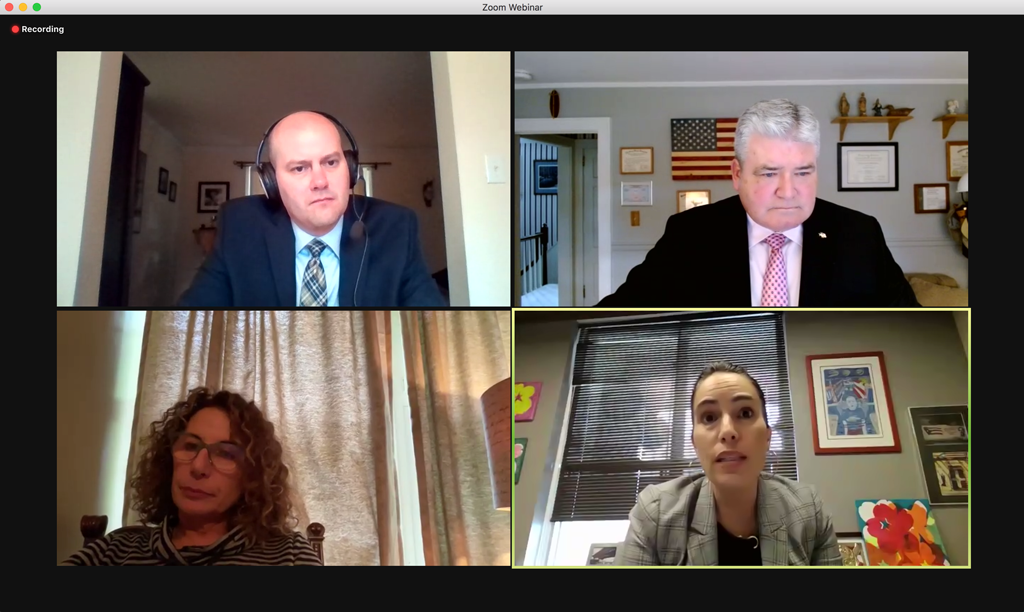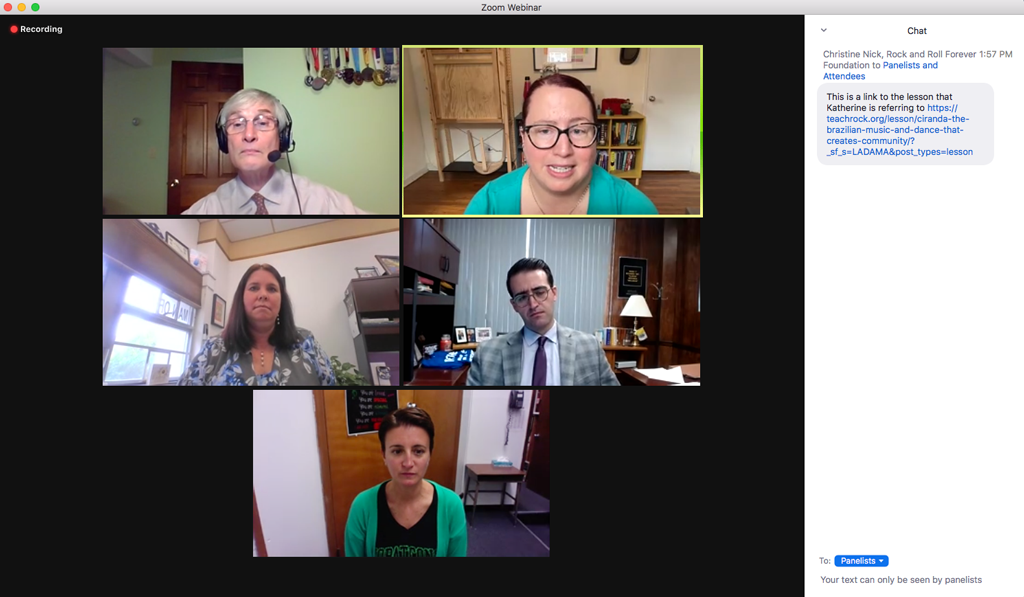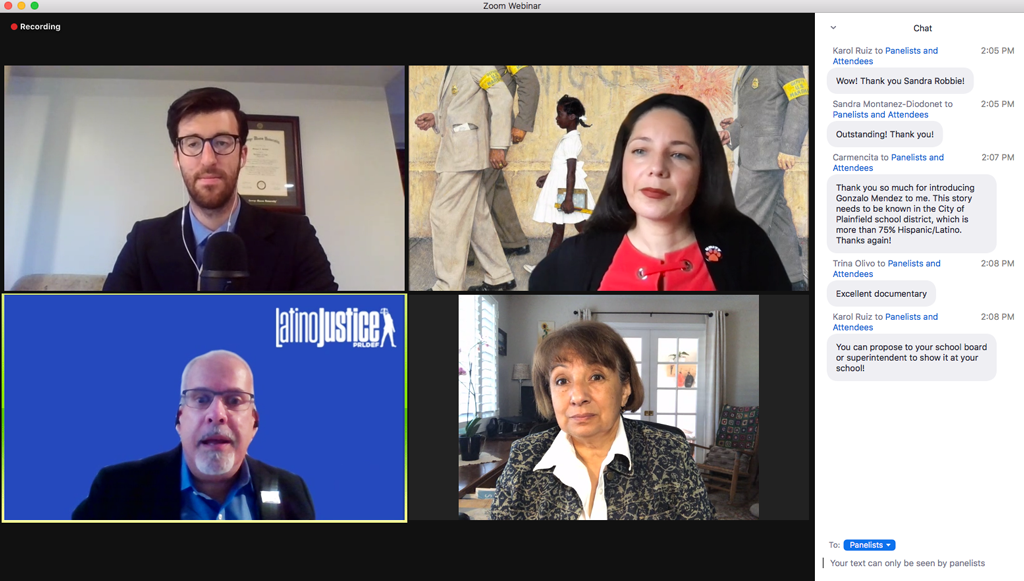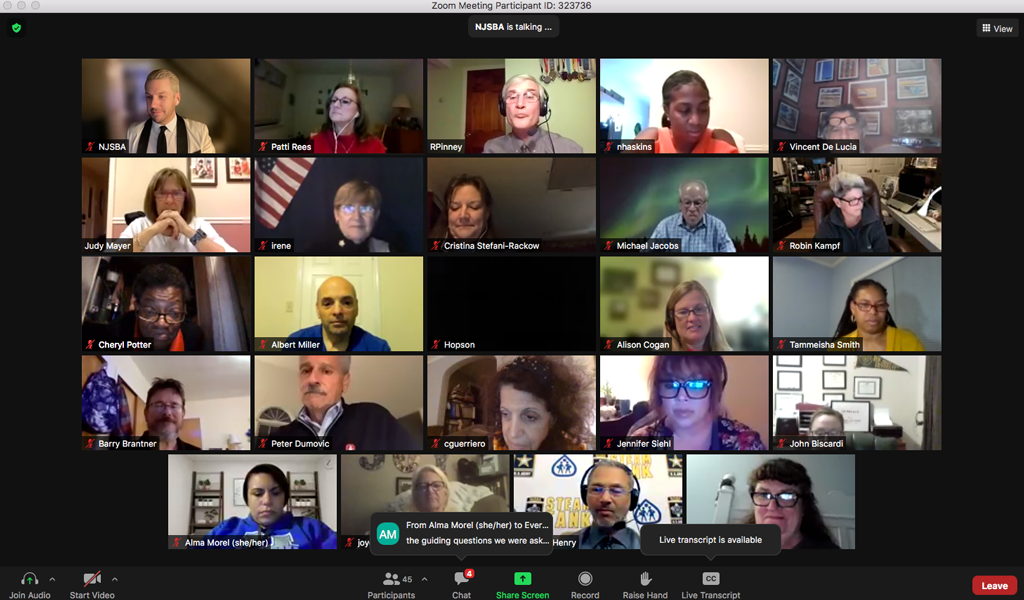More than 5,000 school officials, administrators, educators and others from New Jersey school districts had the opportunity to glean strategies and insights to promote student learning, leverage technology, and capitalize on lessons learned from the COVID-19 pandemic at New Jersey School Boards Association’s Virtual Workshop 2021.
For the second consecutive year, Workshop was held virtually, allowing school district officials to participate in more than 100 training sessions, listen to keynote speakers, network with each other, and visit some 100 exhibitors in five virtual exhibit halls.
Dr. Lawrence S. Feinsod, NJSBA executive director, praised school officials, administrators and the entire education community for coming together to make Virtual Workshop a tremendous success.
“While we wish we could have met in person, our keynote speakers, trainers, sponsors and exhibitors, Association staff and thousands of participants stepped up and demonstrated for a second year in a row how essential it is for Workshop to go on – and how meaningful it can be in a virtual format. We hope to meet in person next year, and we will certainly be using many of the lessons we learned at our Virtual Workshops to make our next conference even more meaningful and productive.”
Virtual Workshop was cosponsored by the New Jersey Association of School Administrators and the New Jersey Association of School Business Officials.
“Together, our New Jersey school community has persevered amid challenging times through the decades,” Feinsod said during opening remarks. “Through wars, natural disasters, global financial crises, and, now during a pandemic that has forever transformed our lives.”
Irene M. LeFebvre, president of the NJSBA, greeted and networked with Virtual Workshop attendees throughout the event – and presented the NJSBA’s Board Member of the Year honor to Kerri Wright, a Chester trustee who she called “truly a champion for all local taxpayers in Chester by focusing on fiscal discipline and responsibility.”
Wright, principal attorney at the Morristown law firm of Porzio, Bromberg & Newman, P.C., which specializes in education, employment and labor, litigation, and data privacy and cybersecurity, said she was honored to receive the award.
“As an attorney who represents school boards, I see the challenges and dedication exemplified by members all over the state, and it is that understanding that helps my level of appreciation for the honor because I know what it means to volunteer my time – particularly at this moment in history when the issues faced by local school boards bring out such passion in our communities,” Wright said.
Keynotes Deliver In addition to networking opportunities, several exhibit halls, and scores of training sessions that registrants can continue to watch on demand for the next few weeks, Virtual Workshop included three keynote speakers.
Maura Baker, a student at West Orange High School and the student representative to the New Jersey Board of Education, kicked off Virtual Workshop on Tuesday, Oct. 26, focusing on the challenges students face navigating the pandemic – as well as the hurdles she’s overcome as a student with dyslexia.
Baker, who calls the condition a learning difference and not a disability, founded a blog, website and Twitter account called Smart Kid — Mad Myths, where she provides students with an array of tips to succeed in school.
Baker provided insights on how fellow students were coping with the pandemic. “Despite all of the ‘new normal’ slogans, this year is far from normal,” she said. After a prolonged period of remote instruction, some students find it hard to pay attention in class, others struggle to wake up early, and others feel they’ve lost test-taking skills, she said.
“Some of the new COVID-19 protocols are also affecting students,” she added. “Some worry about getting sick while others just find it strange or uncomfortable to have to sit with dividers at their desks and wear a mask all day. As we all try to wrap our heads around this new reality, some of us are confused, some of us are sad, some of us are angry, some of us are worried and so on.”
Alisha De Lorenzo, a former educator and a licensed professional counselor, provided public school officials with practical tips for maintaining their well-being while serving during an intense time and preventing burnout.
“At the end of the day the issues that we’re facing are affecting all of us, and toxic stress is undermining students’ abilities to learn,” De Lorenzo said. “This forces us to really think differently about ourselves and the students that we serve, and the systems that we have in place.”
Dr. Angelica Allen-McMillan, acting commissioner of the New Jersey Department of Education, who has spent a 25-year career in education, spoke about her desire to strengthen teaching, accelerate learning, and to increase educational equity for New Jersey’s 1.4 million public school students.
“The convening of this annual conference is particularly powerful following 19 months of unprecedented education,” she said. “This year, while health and safety remain paramount, the reopening of schools for in-person instruction signals renewed hope and momentum.”
Allen-McMillan expressed confidence that after the pandemic, New Jersey schools will emerge “stronger and fairer.” During her talk, she highlighted how more than $4.5 billion in funding has flowed to New Jersey so it can address the academic and mental health impact the pandemic has had on students and educators.
“Providing a safe in-person learning environment has never been more important than during the pandemic, and the Department of Education has worked in concert with our partners at the (state) Department of Health to provide guidance to all stakeholders in the school community,” she said.
Legislative Panel Highlights a Variety of Topics Virtual Workshop attendees also had the chance to listen to a panel of New Jersey legislators address a variety of educational challenges – and outlined their agenda to bolster education moving forward.
Jonathan Pushman, director of governmental relations at NJSBA, moderated the panel in a program co-hosted by the Garden State Coalition of Schools.
The panel included Sen. M. Teresa Ruiz, chair of the Senate Education Committee; Sen. Steven V. Oroho, Republican budget officer; and Assemblywoman Pamela R. Lampitt, chair of the Assembly Education Committee.
Ruiz expressed her gratitude to all those who have worked hard to keep schools open and safe, noting that the pandemic has energized her agenda of tackling learning loss.
“What I will say is during this entire timeframe, as a parent, as a policy maker and as someone who believes that in every dark moment there is a light of hope, this state is flush with funding right now,” she said. “We have a one-time opportunity that has come from the federal government – not solely to make sure our schools are safe for our teachers and administrative staff but then to really move the needle on closing the achievement gap. If we are serious about our commitment to doing that, now will be the time – and I think we have a great opportunity now in the state of New Jersey.”
Teachers, many of whom taught students in-person and virtually at the same time during the pandemic, deserve credit, Lampitt said. But she doesn’t think teachers should have to juggle so much over the long term. “To put our teachers in the position of doing virtual and in-person at the same time is not going to produce the results we want for our children,” she said.
Both Ruiz and Lampitt, however, think remote instruction could be incorporated into schools on a more permanent basis, including to help students that are falling behind or to accelerate learning. Holding remote classes on a Saturday, for instance, could help achieve those goals while reducing or keeping school overhead in check.
Oroho highlighted budgetary concerns, noting that federal American Rescue Plan funds can be spent until 2024. He said New Jersey legislators must come together on a bipartisan basis to promote broadband connectivity even in rural areas.
He also questioned the school funding formula, noting that it’s not a big secret that he’s not a fan of how it is currently written. He called it a “very complicated formula.”
The panel also focused on ways to ease the teacher shortage, including bolstering teacher reciprocity and allowing retired teachers to come back to teach for a certain period.
Another issue panelists focused on was mental health, with Lampitt stating that it’s not just about students. “It is all-encompassing for everyone,” she said, which includes bus drivers, cafeteria staff, janitors and teachers.
Wind Down A new feature this year was the Workshop Wind Down, which began daily at 7 p.m. as part of the three-day conference. Inspired by the popular County Café chat from the previously held in-person conferences, the sessions provided the opportunity for members to network and attend training programs through smaller meet-and-greet gatherings. For the first hour, there were presentations on timely topics; in the second hour, NJSBA staff breakout rooms gave members the chance to ask questions and talk about topics with NJSBA experts in policy, school law, labor relations, communications, and boardsmanship.
On-demand sessions The recorded event is available until Saturday, Nov. 27, to provide attendees with an opportunity to rewatch training sessions they enjoyed and to catch the ones that they missed. The extension also provides those who could not attend a chance to register and capture all that the conference offered.
Registration still open The group rate for NJSBA’s Virtual Workshop 2021 includes up to 25 team members for only $900, including school board members, superintendents, school business administrators, educators and district staff. The individual rate is $450 per person. Business administrators must handle registration.

